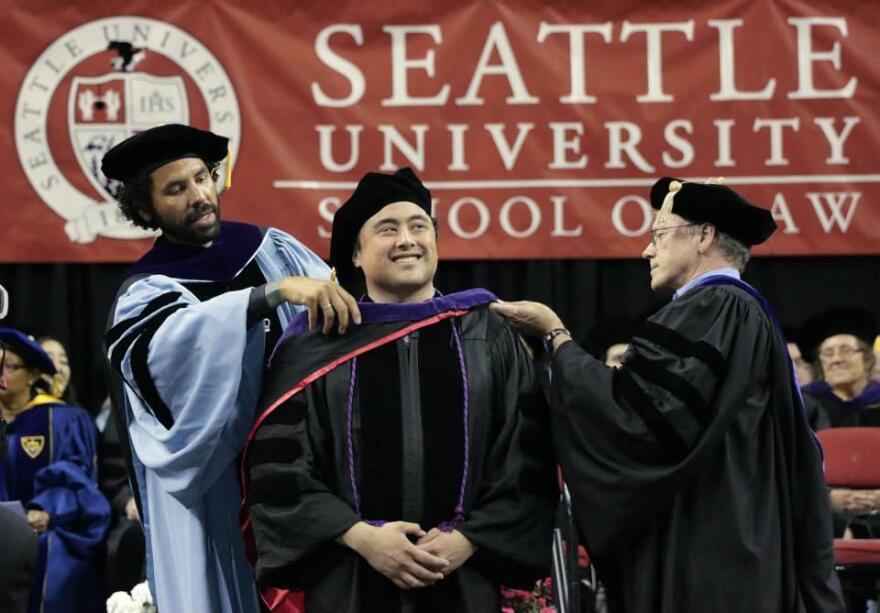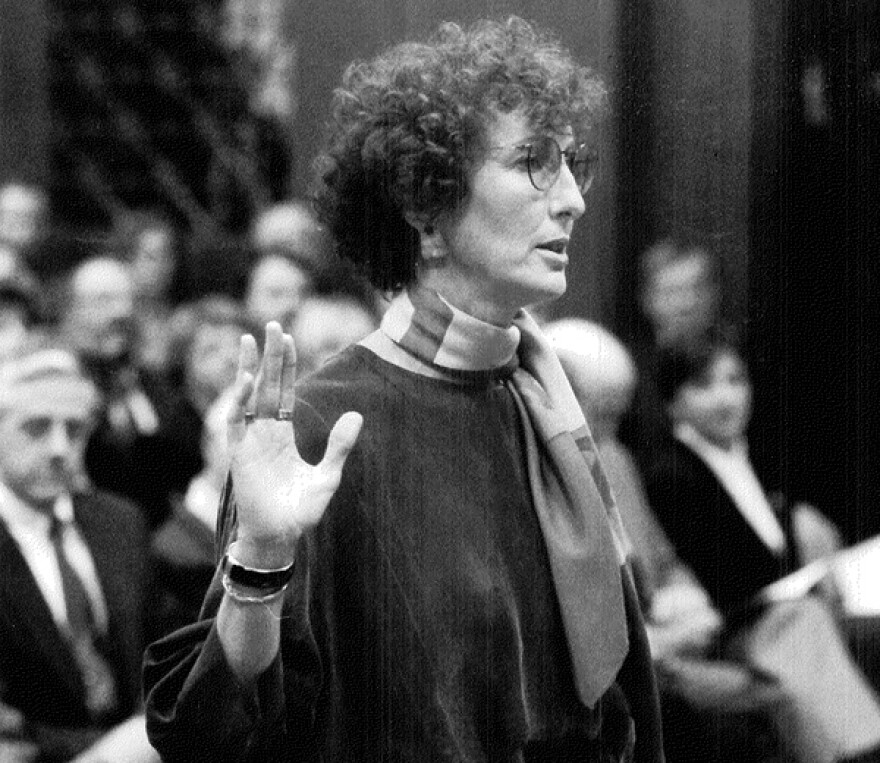Editor's Note: “Senior Thesis” is a special week-long series that brings together venerable veterans in various fields with university students hoping to forge a career in the same field.
At first glance, you might think a former U.S. attorney and a man who once sued the government for spying on him wouldn’t agree on much.
But Kate Pflaumer, U.S. attorney for western Washington during the Clinton administration, and Philip Chinn, a recent graduate of Seattle University School of Law, share a passion for trial work and more.Bit By The Trial Bug
“So you’ve been bit by the bug?” Pflaumer asks Chinn when they sat down for a chat in the KPLU studios.

Chinn tells her it was thrilling when he took part in a court hearing as a legal intern. He says it just confirmed his desire to become a public defender, going to court to argue on behalf of his clients.
Describing trial work, Pflaumer, who had a long career as a public defender before becoming the U.S. attorney and prosecuting crimes, says it’s thrilling for her as well.
“I think it’s probably like an actor going on stage. It’s extremely scary, and when you’re walking to the courthouse, you’re praying a truck will run you over. But once you get in there and the adrenaline is flowing, you fell like all your senses are alive,” Pflaumer said.
Pflaumer does caution Chinn, however, to avoid the pitfalls of the adversarial system.
"Try to think through how the other side feels and what their interests are and, in the end, that will better serve your client,” she said.
The Human Failing You’ll Face
Pflaumer tells Chinn there is something he will likely encounter over and over, a basic human failing he’ll come across: “The common thread in criminal defendants, from white collar down to street crime, is that they are unable to imagine themselves in the future,” she said.
That is why they get in trouble in the first place, she says, and why you sometimes have to explain to a them that “the choice is not between this plea bargain and a trip to Hawaii.”
Am I Too Skeptical?
Chinn, who sued after being spied on for anti-war activities and arrested on a false DUI charge, is worried about striking the right balance as a public defender between fighting for his clients and being sufficiently skeptical of what they tell him.

Chinn says he’s sensitive to the problem because he knows most public defenders would never have believed his story when he was arrested. Luckily, he says, he was able to hire an attorney who was working for anti-war protesters.
“I’m worried about coming down on the wrong side of that balance, of coming down too skeptically,” Chinn tells Pflaumer.
Pflaumer assures Chinn that the fact that he’s aware of the need to strike a balance is the first step in doing the right thing.
As far as defendants not telling you the truth, Pflaumer says sometimes it’s important to give them a legal framework.
“If you’re looking at a person of color who felt cornered, who feels his manhood was in question, he is not going to want to tell you, particularly me, as a white woman, but you, too. He is not going to want to tell you that he is afraid for his life,” she said.
Pflaumer says it’s important, in that case, to make sure they are aware that they can argue self-defense in court if they pulled out a knife because they were afraid for their life.
If Your Clients Really Are Guilty

Pflaumer poses this provocative question to Chinn: “Do you worry about having clients that you know are guilty or dangerous and that you might be walking them out of the courtroom?”
Chinn answers that he knows it may sound terrible, but the possibility doesn’t really bother him.
“If these people are really this dangerous or obviously guilty, it’s the government’s job to prove that. And if the government can’t prove it, that’s not on me, you know,” Chinn said.
Pflaumer probes deeper. She tells Chinn that, as a public defender, she rarely did rape trials because she didn’t want to be sitting at the defense table chatting collegially with a scary rapist in order to give the jury the idea that the rapist was a good guy.
“How would you feel if your ethnicity or age were used to help a client?” Pflaumer asked Chinn.
“Anything that works well for the client,” Chinn replied.
Of course, he adds, he won’t shred evidence or lie, or do anything unethical on behalf of his client.
And that brings up the final bit of advice from the former U.S attorney to the fledgling public defender: No matter what you do, she says, ethical issues will come up. And when they do, “find someone you can trust with a lot of years of experience under their belt who you can talk to."
Who knows? For Chinn, that someone to talk to in the future just might be Pflaumer.







